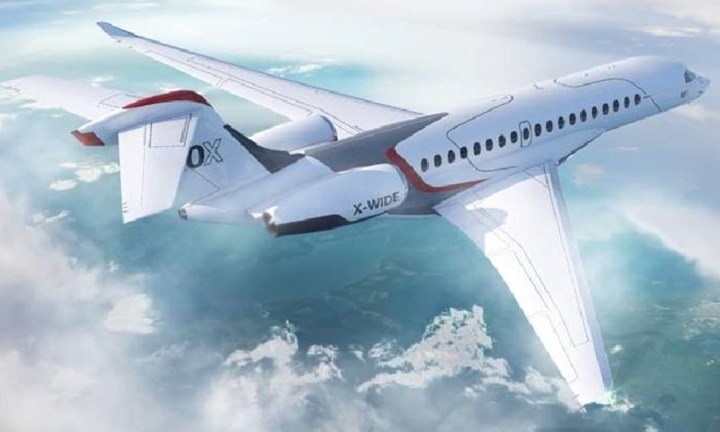Hexcel to supply carbon fiber prepreg for Dassault F10X program
The Falcon F10X will be the first Dassault Aviation business jet program to incorporate high-performance carbon fiber in the manufacture of its aircraft wings.

Photo Credit: Dassault Aviation
Hexcel (Stamford, Conn., U.S.) announced on July 14 that it has signed a long-term agreement with Dassault Aviation (Paris, France) to supply carbon fiber prepreg for the Falcon 10X program. This is said to be the first Dassault business jet program to incorporate high-performance carbon fiber composites in the manufacture of its aircraft wings (see “Dassault Aviation kicks off multi-site Falcon 10X production”).
Dassault Aviation has selected HexPly M21EV/IMA, a high-performance composite material that has proven over the past 10 years to meet high-efficiency manufacturing standards. Thanks to Hexcel carbon fiber composites, Dassault says the wide, high-speed wing will be made for maximum strength, reduced weight and minimum drag. The Falcon 10X is planned to enter service at the end of 2025.
“I am delighted that Dassault has decided to expand our partnership of more than 40 years with the selection of Hexcel materials to design and produce its first Falcon carbon fiber wing based on Hexcel advanced composite technology,” Thierry Merlot, Hexcel president Aerospace Europe, Asia Pacific, Middle East, Africa & Industrial, says. “Our strong, durable and lightweight carbon fiber prepreg is helping customers such as Dassault every day to push the boundaries and create the future of next-generation aircraft.”
Related Content
-
The lessons behind OceanGate
Carbon fiber composites faced much criticism in the wake of the OceanGate submersible accident. CW’s publisher Jeff Sloan explains that it’s not that simple.
-
Bio-based acrylonitrile for carbon fiber manufacture
The quest for a sustainable source of acrylonitrile for carbon fiber manufacture has made the leap from the lab to the market.
-
TU Munich develops cuboidal conformable tanks using carbon fiber composites for increased hydrogen storage
Flat tank enabling standard platform for BEV and FCEV uses thermoplastic and thermoset composites, overwrapped skeleton design in pursuit of 25% more H2 storage.













